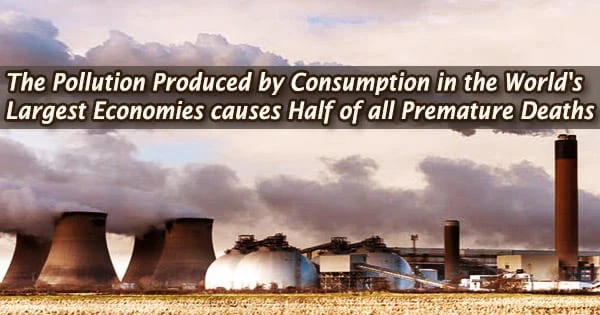PM2.5 particles are responsible for the haze that obscures a blue sky or a lovely skyline. PM2.5 refers to particulate matter that is smaller than 2.5 microns in diameter and is commonly caused by pollution. PM2.5 particles, despite their microscopic size, cause more than 4 million premature deaths each year.
According to a new study published in Nature Communications by Japanese researchers, pollution generated by consumerism in the world’s largest countries is responsible for half of those deaths. A death that happens before a population’s typical age of death.
PM2.5 is extremely harmful due to its small size. They are easily inhaled and build up inside the lungs, increasing the risk of cancer and other dangerous diseases. The impoverished, on the other hand, are particularly prone to PM2.5 and die young.
The average death age in the United States is around 75 years. In the United States, smoking cigarettes and being exposed to secondhand tobacco smoke are the major causes of early death. They can put you at risk for cancer, heart disease, stroke, lung disease, and a variety of other illnesses. Injuries and suicide are two other causes of early death.
“Most deaths are in developing countries, and without international coordination, the situation will worsen,” said Dr. Keisuke Nansai, Research Director at the Material Flow Innovation Research Program of the National Institute for Environmental Studies in Japan, who had been a visiting professor at ISA of the University of Sydney, and one of the lead authors of the study.
Over 4 million people die prematurely each year as a result of exposure to ambient PM2.5. Because the majority of these deaths occur in developing nations, this polarized scenario will persist without international coordination.
According to the World Health Organization (WHO), respiratory and cardiovascular diseases, as well as cancer, were responsible for approximately 4.2 million premature deaths in 2016, as a result of exposure to ambient PM2.5. They define premature deaths as deaths that occur before the average age of death in the population. The bulk of these deaths occurred in low- and middle-income countries, and 91 percent of the world’s population lives in locations where air quality falls short of WHO standards.
Pollution in the form of production emissions creates a motive to implement joint PM2.5 reduction measures in neighboring countries. Such cooperation is unlikely among countries that are geographically distinct.
Dr. Keisuke Nansai
While most countries recognize their role in PM2.5 levels, there is limited agreement on how much they contribute and consequently their financial responsibilities. The amount caused by the consumption, in instance, is significantly more difficult to quantify than the direct creation of PM2.5 by companies and autos.
According to Nansai, this is a critical question to answer. Unlike direct production, which affects the producing country first and subsequently spreads across borders to neighboring countries, PM2.5 from consumption can come from far away and have insignificant effects on the consuming country.
“Pollution in the form of production emissions creates a motive to implement joint PM2.5 reduction measures in neighboring countries. Such cooperation is unlikely among countries that are geographically distinct,” said Nansai.
In 2013, the global workforce loss due to early deaths caused by PM2.5 was estimated to be worth 225 billion US dollars. While the reduction in air pollution brought about by the COVID-19 pandemic6 has helped to alleviate the effects on human health, it is neither sufficient nor long-term.
G20 countries account for more than three-quarters of global trade and economic output. As a result, Nansai and his colleagues reasoned, knowing how these countries’ consumption affects PM2.5 levels would provide a valid benchmark.
The study mapped out the emissions produced solely by consumption using Eora, a database created nearly a decade ago to analyze global supply chains around the world.
According to the study, the world’s most consuming nations, such as the United States and the United Kingdom, cause a significant number of premature deaths in faraway countries like China and India, whereas premature deaths caused by production habits are more common in neighboring countries like Mexico and Germany.
COVID-19, the world-changing pandemic, is a respiratory ailment that is particularly deadly to the elderly. Similarly, PM2.5 premature victims are primarily old. Unlike COVID-19, however, the study discovered another group that is extremely vulnerable to PM2.5 caused by consumption.
“We found that the consumption of G20 nations was responsible for 78,000 premature deaths of infants (up to 5 years old) worldwide,” noted Nansai.
The effect was not too great in most G20 nations, such that the average age of premature deaths was nearly 70 years old.
Premature infant death was so common in some nations, such as South Africa and Saudi Arabia, that the average age of premature deaths was under 60 years old. In India and Indonesia, the average age of premature deaths barely passed this threshold.
Most countries will not believe they should pay any consequence for these fatalities, according to Nansai and his colleagues, if consumption is not taken into account.
“As long as responsibility for infant deaths due to production emissions is the only issue pursued, we can find no rationale for nations to confront the mass death of infants (in faraway nations),” they write in the study.
Finally, to underscore the impact of PM2.5 levels based only on consumption on human health, the study found that the lifetime consumption of 28 persons in G20 countries will result in the premature death of one person globally.
















